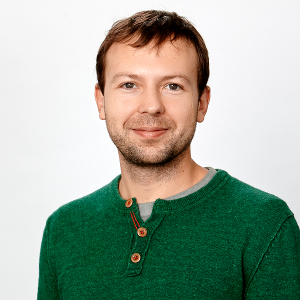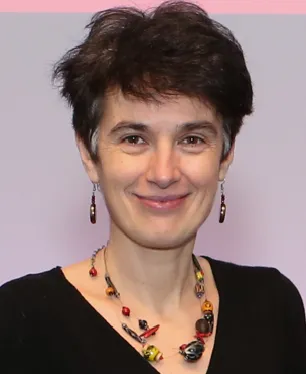Speakers
The workshop features a diverse group of invited speakers who will deliver keynote talks.

Andrew Gordon Wilson is an Associate Professor at the Courant Institute of Mathematical Sciences and Center for Data Science at NYU. Prof. Wilson wishes to develop a prescriptive foundation for building intelligent autonomous systems, with work involving Bayesian inference, distribution shifts, scientific discovery, and generalization in deep learning. He has been Workshop Chair, Tutorial Chair, EXPO Chair, and Senior Area Chair for major machine learning conferences, and has received numerous awards, including the NSF CAREER Award, the Amazon Research Award, and best paper, reviewer, area chair, and dissertation awards.

Christoph Bergmeir is a María Zambrano (Senior) Fellow in the Department of Computer Science and Artificial Intelligence at University of Granada, Spain, and an Adjunct Senior Research Fellow in the Department of Data Science and Artificial Intelligence at Monash University. Before this, he was a Visiting Research Data Scientist at Meta Inc. (former Facebook Inc.) in California in the US, and a Senior Lecturer at Monash University. He has a track record of working in forecasting for capacity planning, sustainable energy, and supply chain, and has led teams that have delivered systems for short-term power production forecasting of wind and solar farms, and energy price forecasting. Christoph holds a PhD in Computer Science from the University of Granada, and an M.Sc. degree in Computer Science from the University of Ulm, Germany. He has over 5,800 citations and an h-index of 30. He has received more than AUD $2.7 million in external research funding. Four of his publications on time series forecasting over the last years have been Clarivate Web of Science Highly Cited Papers (top 1% of their research field).

Mihaela van der Schaar is the John Humphrey Plummer Professor of Machine Learning, Artificial Intelligence and Medicine at the University of Cambridge. In addition to leading the van der Schaar Lab, Mihaela is founder and director of the Cambridge Centre for AI in Medicine (CCAIM). Mihaela was elected IEEE Fellow in 2009 and Fellow of the Royal Society in 2024. She has received numerous awards, including the Johann Anton Merck Award (2024), the Oon Prize on Preventative Medicine from the University of Cambridge (2018), a National Science Foundation CAREER Award (2004), 3 IBM Faculty Awards, the IBM Exploratory Stream Analytics Innovation Award, the Philips Make a Difference Award and several best paper awards, including the IEEE Darlington Award. She was a Turing Fellow at The Alan Turing Institute in London between 2016 and 2024. Mihaela is personally credited as inventor on 35 USA patents (the majority of which are listed here), many of which are still frequently cited and adopted in standards. She has made over 45 contributions to international standards for which she received 3 ISO Awards. In 2019, a Nesta report determined that Mihaela was the most-cited female AI researcher in the U.K.

Tomas Pfister is the Head of AI Research at Google Cloud where he leads efforts in inventing cutting-edge AI solutions to a wide range of real-world problems. He came to Google from Apple where he cofounded Apple’s new central research group for Artificial Intelligence. He published Apple’s first research paper and won the Best Paper Award at CVPR, one of the most prestigious awards in AI. Tomas’ key scientific achievements have been proposing a method to improve the realism of synthetic images; developing the first automated method to detect facial micro-expressions; inventing a new way for neural networks to exploit spatiotemporal structure; one of the most accurate forecasting models for the COVID-19 pandemic; and state-of-the-art models for time series forecasting and tabular data prediction. His research has laid the foundation for several applications such as Face ID in iPhone X, autonomous driving, human pose estimation, detecting facial micro-expressions, translating sign language, document understanding, manufacturing defect detection, retail demand forecasting, and recommendation systems. Tomas did his PhD in deep learning with Prof Andrew Zisserman at Oxford University and bachelor’s degree in computer science at Cambridge University. He is the recipient of the Forbes 30 Under 30 award, and has received over 40 research awards, including 3 best paper awards, with numerous publications in top AI research venues. His work has been frequently featured in mainstream media, including Forbes, BusinessInsider & Wired, as well as in Apple’s inaugural Machine Learning Journal post.

Qingsong Wen is the Head of AI Research & Chief Scientist at Squirrel Ai Learning Inc., leading a team (in both Seattle and Shanghai) working in EdTech area via AI technologies (like LLM, AI Agent, GenAI, Transformer, SSL, GNN, XAI, etc.). Before that, he worked at Alibaba, Qualcomm, Marvell, etc., and received his M.S. and Ph.D. degrees in Electrical and Computer Engineering from Georgia Institute of Technology, USA. His research interests include machine learning, data mining, and signal processing, especially AI for Time Series (AI4TS), AI for Education (AI4EDU), Decision Intelligence, LLM and GenAI. He has published over 100 top-ranked AI conference and journal papers, had multiple Oral/Spotlight Papers at NeurIPS, ICML, and ICLR, had multiple Most Influential Papers at IJCAI, received multiple IAAI Deployed Application Awards at AAAI, and won First Place of SP Grand Challenge at ICASSP. Currently, he serves as Organizer/Co-Chair of Workshop on AI for Time Series (AI4TS @ KDD, ICDM, SDM, AAAI, IJCAI) and Workshop on AI for Education (AI4EDU @ KDD, CAI). He also serves as Associate Editor for Neurocomputing, Associate Editor for IEEE Signal Processing Letters, Guest Editor for Applied Energy, and Guest Editor for IEEE Internet of Things Journal. In addition, he has regularly served as Area Chair of the AI conferences including NeurIPS, KDD, ICASSP, etc.

Valentina Zantedeschi is a Senior Research Scientist at ServiceNow, Adjunct Professor at Laval University of Quebec and member of the ELLIS Society. Her research focuses on building ML models that are inherently interpretable via latent discrete structures, with applications in remote sensing, time-varying modelling and causal discovery. Previously, she was a post-doctoral researcher at INRIA and University College London, and a researcher at the European Space Agency’s funded FDL research accelerator, where she developed weather forecasting and change detection AI models. Valentina holds a PhD from Jean Monnet University (France), with a thesis on data-dependent kernel learning with generalization guarantees, for which she received the best thesis award 2019 from the French Society for AI (AFIA). As a research intern at IBM, Dublin, she wrote the codebase of the initial release of Adversarial Robustness Toolbox, a widely deployed library for analyzing the robustness of AI models to adversarial examples.